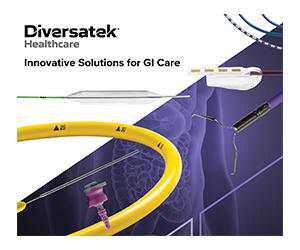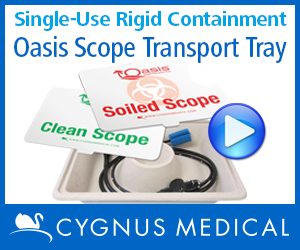A new endoscopic system powered by artificial intelligence (AI) has today been shown to automatically identify colorectal adenomas during colonoscopy. The system, developed in Japan, has recently been tested in one of the first prospective trials of AI-assisted endoscopy in a clinical setting, with the results presented today at the 25th UEG Week in Barcelona, Spain.
The new computer-aided diagnostic system uses an endocytoscopic image – a 500-fold magnified view of a colorectal polyp – to analyze approximately 300 features of the polyp after applying narrow-band imaging (NBI) mode or staining with methylene blue. The system compares the features of each polyp against more than 30,000 endocytoscopic images that were used for machine learning, allowing it to predict the lesion pathology in less than a second. Preliminary studies demonstrated the feasibility of using such a system to classify colorectal polyps, however, until today, no prospective studies have been reported.
The prospective study, led by Dr. Yuichi Mori from Showa University in Yokohama, Japan, involved 250 men and women in whom colorectal polyps had been detected using endocytoscopy. The AI-assisted system was used to predict the pathology of each polyp and those predictions were compared with the pathological report obtained from the final resected specimens. Overall, 306 polyps were assessed real-time by using the AI-assisted system, providing a sensitivity of 94 percent, specificity of 79 percent, accuracy of 86 percent, and positive and negative predictive values of 79 percent and 93 percent respectively, in identifying neoplastic changes.
Speaking at the Opening Plenary at UEG Week, Mori explained; “The most remarkable breakthrough with this system is that artificial intelligence enables real-time optical biopsy of colorectal polyps during colonoscopy, regardless of the endoscopists’ skill. This allows the complete resection of adenomatous polyps and prevents unnecessary polypectomy of non-neoplastic polyps.”
“We believe these results are acceptable for clinical application and our immediate goal is to obtain regulatory approval for the diagnostic system,” added Mori.
“Moving forward, the research team is now undertaking a multicentre study for this purpose and also working on developing an automatic polyp detection system. Precise on-site identification of adenomas during colonoscopy contributes to the complete resection of neoplastic lesions.
“This is thought to decrease the risk of colorectal cancer and, ultimately, cancer-related death.”
Source: 25th UEG Week
Artificial intelligence: Is this the future of early cancer detection?
0
76
SHARES
1.3k
VIEWS
Leave a Reply Cancel reply
Browse by Category
Tags
AAMI
AORN
Award
Bacteria
BIOCHEMISTRY
biology
cancer
CBSPD
Chemotherapy
colon cancer
colorectal cancer
colorectal cancer screening
COVID-19
Diagnostics
Duodenoscope
Education
EndoChoice
EndoPro Magazine
Endoscope
Endoscopy
FDA
gastroenterology
gastrointestinal disorders
Genetics
Healthmark
Hospitals
IAHCSMM
IBD
IBS
Infections
irritable bowel syndrome
MEDICINE/HEALTH
News
Olympus
Pentax
PHARMACEUTICAL CHEMISTRY
PHARMACEUTICAL SCIENCE
polyps
PPE
Public Health
recall
Screening
SGNA
Studies
Super Bugs
© 2023 Copyright. All Rights Reserved. Design & Developed by Insightful Technologies.















